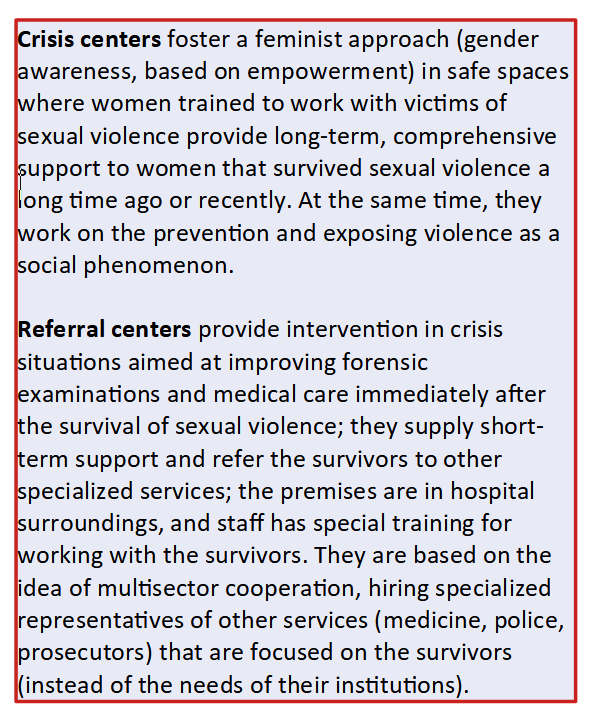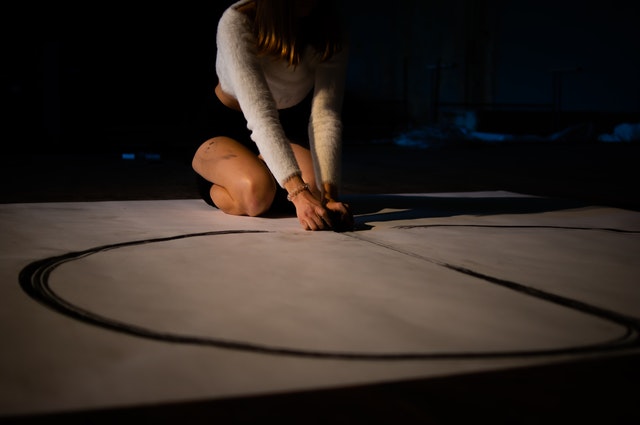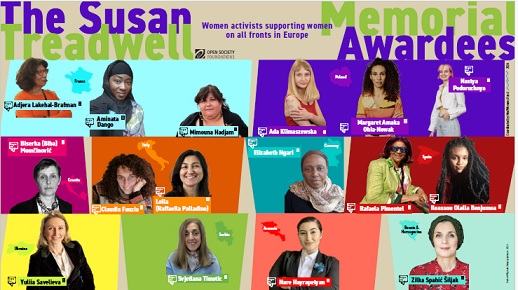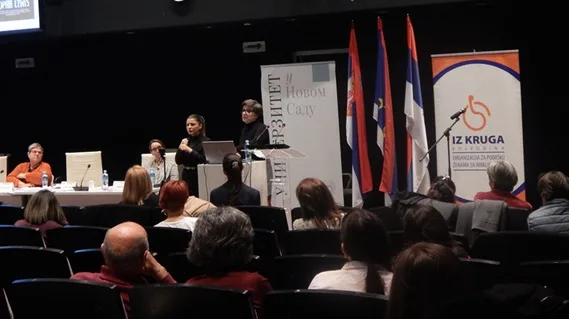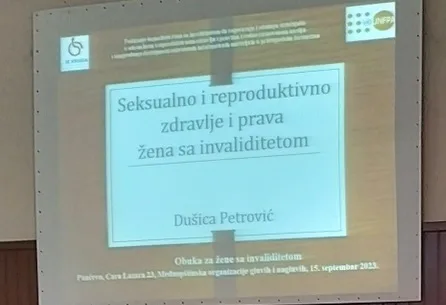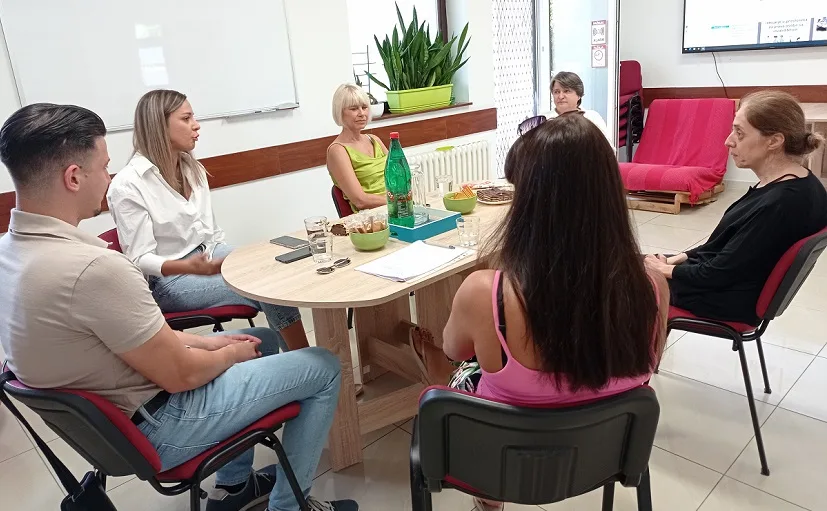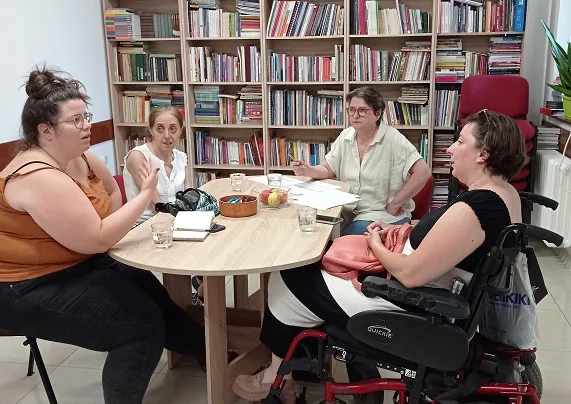The traumatic nature of sexual violence, including rape, demands particularly delicate responses from trained and specialized personnel for all women that have survived violence regardless of their personal traits. Each woman exposed to sexual violence needs urgent medical help and legal and psychological support in trauma in combination with immediate forensic examination to collect evidence required for criminal prosecution.
By ratifying the Istanbul Convention, we undertook the obligation to establish specialized services for handling cases of sexual violence in the form of crisis or referral centers.
Four centers for victims of sexual violence function in Vojvodina: In Novi Sad, Zrenjanin, Kikinda, and Sremska Mitrovica. In all of them, the rooms of the centers are in health institutions. According to Danica Todorov, a coordinator of the center, the centers in question are referral centers:
– Victims come to centers mainly after they report violence to the police immediately after the event itself. Doctors on duty perform the examinations, trained or not for dealing with the victims of sexual violence. The centers, most often, provide interventions in crisis situations, but we have experience of extended support too – says Danica and adds: – We planned crisis centers, but we need much more resources than we managed to provide.
During the founding process, training about multisector cooperation was realized; the representatives of health institutions, the police, the judicial system, welfare centers, and NGOs attended the training. How the education contributed to sensitization, Danica Todorov says:
– We encountered initial resistance, in the sense that procedures for working with the victims of rape have already existed, and the misunderstanding of the difference the centers were establishing. Now there is awareness about violence against women, about the survivor’s needs being in the center and not the needs of the institution, about the manner of talking to the survivor, handling women from vulnerable groups, keeping records, and data protection – that changed. Still, there is a need for continuous education because new people are hired in all institutions.
As a novelty that the centers introduce into the existing support system for women survivors of sexual violence, Danica Todorov emphasizes the importance of psychological support and performing all examinations in one place:
– The most important is that women get psychological support which is of essential consequence for their faster recovery, and it doesn’t exist in our system. Health services and forensic medical examinations existed in the previous system, but the difference is that victims do health examinations in one place instead of walking through the system. They also get advice about the protection of their sexual and reproductive health, protection from sexually transmitted diseases, and unwanted pregnancies. The former system didn’t do that – she specified.
Unfortunately, providing a safe space and treating women in one secure place is not achieved in practice because services were moved to different rooms according to requirements, to the ones the hospital designated.
Counselors trained for working with women survivors of violence provide psychological support (social workers and psychologists with work experience in Social welfare centers, NGOs, women’s safe houses, etc.). The first contact with the survivor is most commonly made before or during the medical examination, and the possibility of prolonged psychological support may be discussed afterward. The services are available 24 hours a day, seven days a week; in other words, there is always a counselor on duty. Not infrequently, the survivors reject psychological support during their first encounter with a counselor because they are in a state of shock, tormented by long talk to the police and the general procedures of the hostile system.
– It is a challenge to stand out, to show a woman that I am not just another one in the system that does her job routinely – says Branislava Golic, a counselor from the center in Sremska Mitrovica. – I make contact with the survivor at the time of processing the case when she has already been with the representatives of the police and health service, so I have to be particularly clear that I am there solely to give her support. Considering the state of shock she is in, it is debatable how much information she can comprehend.
Often, women that survived sexual violence and rape share their experience of secondary victimization through the system with their counselor. Branislava Golic says:
– What kind of treatment the survivor would have in the prosecutor’s office, police, or health system depends exclusively on individuals that would be there at that very moment. Some of them are better sensitized, some worse. In the health system, the job is done routinely; there is no individual approach; the requirements of the institution are at the forefront and not the survivor; most often, the employees have no motif to deal with the woman’s interest.
The counselors from Novi Sad center are not present while the police take a statement from the survivor, so they cannot provide support during inappropriate interrogation but are mitigating the damage police officers made afterward. In the words of Andjelka Vujanic, the counselor of the Novi Sad Center:
– The credibility of every woman is questioned, at least by the police. It is unbelievable that in the case of a woman that has been dislocated for years because of the sexual violence she survived, they didn’t start the procedure because she didn’t fight back. She dissociated herself long ago; of course, she didn’t fight back! I get the impression that our police focus on avoiding the procedure, convincing the woman that she consented to the violence and that she is lying.
Branislava Golic has different experiences with dealing with the police in Sremska Mitrovica. She states that the cases of women with disabilities created a somewhat better treatment of all women that reported sexual violence, but secondary traumatization is still strong:
– Police officers used to reject my presence, but now they don’t mind me at the statement giving; we are all directed at easing the procedure for the survivor. By and large, they understood that I could be helpful since they have been having difficulties with women with combined or psychical disabilities. If I notice inappropriate handling, I can react.
Danica Todorov reports that from the founding of the center in 2017, approximately two hundred women received support; 30% were girls younger than 15, and just around ten were women with disabilities, mostly with developmental and intellectual disabilities.
– Since the establishment of the centers, we have taken care to assure accessibility to all categories of women. Talking about women with disabilities, immediately after the establishment of the centers, the personnel received Guidelines for working with women with different types of disabilities prepared by the organization IZ KRUGA VOJVODINA. Educational meetings about the specific position of women with disabilities and dealing with women with various types of disabilities were held.
From the beginning, we contemplated making the premises and all the gynecological equipment physically accessible to women with motor disabilities, but it wasn’t always possible. When it comes to deaf women, centers do not provide services of sign language interpreters, and the personnel of the center doesn’t know whom to address for that kind of support. When dealing with blind women, the personnel reads the content of all statements and clarification of the procedure, which is part of the standard procedure for working with all women. There are no audio materials or materials in Braille. Working with women with intellectual disabilities, the personnel adjusts the communication in simplified language for them to understand.
A counselor Branislava Golic has so far had the experience of working with three women with different types of disabilities (combined sensory, intellectual, and mental).
– Working with a blind and hard-of-hearing woman has been the most challenging because I had no experience working with women with sensory disabilities. There were a number of challenges communication-wise, in addition to which I was giving her instructions for orienteering in an unknown space. I was wondering whether I was speaking clearly, or was too loud, but she needed to hear me well – meaning I was thinking of myself while working with her, which is not advisable at all. Still, despite all the barriers, she got all the necessary information and support, I think.
A counselor Andjelka Vujanic has years of experience working in persons with disabilities organizations. In the center, she came across two women with intellectual disabilities and one with epilepsy. She has experience working with hard-of-hearing women and deaf women who are verbal and can lip-read but estimates that she doesn’t have the knowledge and competence to work with non-verbal women. In her opinion providing a sign language interpreter is not a satisfactory solution for psychological support to deaf women; counselors who use sign language are necessary.
– From my point of view, it is a problem communicating in a counseling process through a mediator. Whatever we hear, the information goes through a black box, and we present it from ourselves again. Of course, our words are conveyed, but not literally, filtered through someone’s observation and knowledge and then reach the third person. To dare to work with deaf women, I would have to know sign language, and make direct communication since different terms have different interpretations in our minds – she explained.
Counselors point out the significance of adjusting the services to women with disabilities and are aware of the multiple risks and additional discrimination these women face in the entire system.
– There is a narrative that a woman has to put up with the rape of her husband or partner or suffer beatings. These narratives are deeply rooted. Experiences of women with disabilities are additionally burdened with accounts about disabilities, putting them at higher risk of violence. They have fewer employment opportunities, often depend on other people, and under the influence of all these narratives, they have reduced self-confidence – says Andjelka Vujanic. Talking about women with intellectual disabilities, ways of understanding and communication are entirely different. One of them was nearly fifteen when we started working. Given that she grew up in foster families, first in a violent family and then in social welfare institutions, she didn’t know the language of emotions. We started the work with emoticons: to explain her feeling toward a particular emoticon, color it, and describe what it means to her. It made the process longer. It is necessary to adapt the communication because things we usually take for granted in such cases need to be determined.
Due to the predetermined assumption that no one will believe them, women with intellectual disabilities are a target of sexual predators; the system confirms such beliefs, essentially giving license and permission for violence against them. Centers for victims of sexual violence in Vojvodina are aware of the problem, but they neither have a mechanism for adequate protection nor the ability to influence the change in the system for women of the general population, making women with disabilities, especially if a disability is an intellectual stay at the margins of a margin:
– Situations of women with intellectual disabilities are strenuous because the police mainly don’t believe them, and very often, an estimate from the psychiatrist is entailed. For example, the prosecutor in Zrenjanin asks for a mandatory talk with a psychiatrist. In the case of women with intellectual disabilities, in the background is an assessment of her credibility, whether what she says is reliable. Prosecutors want firm material evidence, which is a kind of guarantee that the opinion will be credible during the procedure, although there are cases where prosecutors accepted the counselor’s statements about what happened and how the survivor felt. When a woman speaks about her experience or cannot describe what happened, psychiatrists step in to clarify to others in the system what they think is going on, which most often inclines toward discrediting her experience. She is credited with inventing or not being capable enough to explain such an experience. If the survivor has a guardian, they often support such an opinion. Overall, the manner of the investigation and asking questions is disagreeable; it appears as if they are looking for inconsistencies to dismiss the case, which features in experiences of women with disabilities in particular – says Danica Todorov. One of the main issues is that police and prosecutors still don’t comprehend the importance of centers; they neither understand the needs of a victim nor communicate with personnel hired to provide health and psychological support.

Danica Todorv adds that, although there are deficiencies in the practical realization of the concept and the purpose of the centers for victims of sexual violence, the public hasn’t got sufficient information about the existence of the centers and their work in Vojvodina, the results up to now are adequate. They show the need for this type of service, its promotion, and the need to improve the knowledge and experience of all those involved in the process.
– Psychosocial support is financed from the donation funds and not from the budget of the Republic of Serbia or local government, meaning that the services depend on sufficient funding. The fact that the service is not recognized in the system makes the relationship of all those involved in the protection and support process variable – she concluded.
Branislava Golic confirms that the existence of the centers, as the importance of the counselors’ work, is not recognized sufficiently:
– We get feedback from the women, who say that our services are very helpful, but we are still far from positioning the centers within the system, and from other relevant institutions cooperating with us – she said.
The question remains if something like that might be realized in the foreseeable future. It appears that five years haven’t been enough to make a change in the support system for women survivors of violence and protect them from secondary traumatization. Instead, the centers have adjusted to the rigid system and continued to use existing resources (non-sensitized medical personnel, police officers that accuse the victim of violence, prosecutors’ primary interests, etc.). Basically, the only thing centers manage to do is to provide counselors for field work any time, day or night, believing that they can downsize secondary violence that a survivor will face in the so-called comprehensive support system. The counselors have an impossible mission. From the original idea about the centers for the victims of sexual violence, for now, only counselors remain; something that always existed: women supporting women in all possible and impossible conditions.
Photo: Pexel
Translated by: Suzana Belos
This media content was created within the project „Improving the safety of women in Serbia“, which is implemented by the United Nations Entity for Gender Equality and Empowerment of Women in Serbia (UN Women), with the support of the Norwegian Embassy in Belgrade. The views in this text belong exclusively to the author and the editors of the Disability Portal; they do not necessarily represent the views of UN Women and the Norwegian Embassy.

